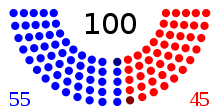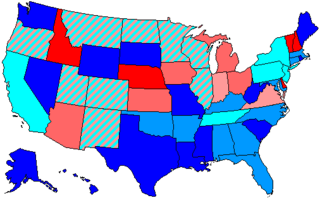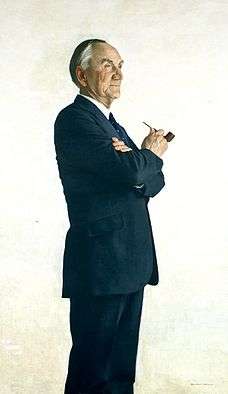92nd United States Congress
| 92nd United States Congress | |||||||||||||||||||||||||||||
| |||||||||||||||||||||||||||||
The Ninety-second United States Congress was a meeting of the legislative branch of the United States federal government, composed of the United States Senate and the United States House of Representatives. It met in Washington, DC from January 3, 1971 to January 3, 1973, during the third and fourth years of Richard Nixon's presidency.
The apportionment of seats in this House of Representatives was based on the 1960 Census. Both chambers had a Democratic majority.
Major events
Passing legislation on revenue-sharing was a key event of the congress. President Richard Nixon had it listed on his list of top policies to cover for the year. Nixon signed the bill into law at Independence Hall in Philadelphia. The law gained support from many state and local officials including: San Francisco Mayor Joseph Alioto whose city received $27 million in revenue-sharing money in the first year. Alito said that many projects that would not have been possible could now be done, "That will effectively enable us to meet those programs which up to now because of very tough budgeting we've had to trench."[1]
Major legislation
- December 18, 1971: Alaska Native Claims Settlement Act, Pub.L. 92–203, 85 Stat. 688
- December 23, 1971: National Cancer Act, Pub.L. 92–218, 85 Stat. 778
- February 7, 1972: Federal Election Campaign Act, Pub.L. 92–225, 86 Stat. 3
- March 24, 1972: Equal Employment Opportunity Act, Pub.L. 92–261, 86 Stat. 103
- June 23, 1972: Title IX Amendment of the Higher Education Act, Pub.L. 92–318, 86 Stat. 235
- October 6, 1972: Federal Advisory Committee Act, Pub.L. 92–463, 86 Stat. 770
- October 18, 1972: Federal Water Pollution Control Amendments of 1972, Pub.L. 92–500, 86 Stat. 816
- October 21, 1972: Marine Mammal Protection Act, Pub.L. 92–522, 86 Stat. 1027
- October 27, 1972: Consumer Product Safety Act, Pub.L. 92–573, 86 Stat. 1207
- October 27, 1972: Noise Control Act, Pub.L. 92–574, 86 Stat. 1234
- October 27, 1972: Coastal Zone Management Act, Pub.L. 92–583, 86 Stat. 1280
Approved Constitutional amendments
- March 23, 1971: Twenty-sixth Amendment to the United States Constitution (ratified July 1, 1971)
- March 22, 1972: District of Columbia Voting Rights Amendment (unratified; ratification period expired in 1979 or 1982)
Party summary
The count below identifies party affiliations at the beginning of the first session of this Congress, and includes members from vacancies and newly admitted states, when they were first seated. Changes resulting from subsequent replacements are shown below in the Changes in membership section.
Senate

- Democratic: 54 (majority)
- Republican: 44
- Conservative: 1
- Independent: 1
TOTAL members: 100
House of Representatives

| House seats by party holding plurality in state | |
|---|---|
| 80% Democratic |
80%+ Republican |
| 60%+ to 80% Democratic |
60%+ to 80% Republican |
| up to 60% Democratic |
up to 60% Republican |
- Democratic: 255 (58.6%)(majority)
- Republican: 180 (41.4%)
TOTAL members: 435
Leadership
Senate
- President of the Senate: Spiro Agnew (R)
- President pro tempore:
- Richard Russell, Jr. (D), until January 21, 1971
- Allen J. Ellender (D), January 22, 1971 – July 27, 1972
- James Eastland (D), from July 28, 1972
Majority (Democratic) leadership
Minority (Republican) leadership
House of Representatives
- Speaker: Carl Albert (D)
Majority (Democratic) leadership
Minority (Republican) leadership
Caucuses
Members
This list is arranged by chamber, then by state. Senators are listed in order of seniority, and Representatives are listed by district.
Senate
Senators are popularly elected statewide every two years, with one-third beginning new six-year terms with each Congress. Preceding the names in the list below are Senate class numbers, which indicate the cycle of their election. In this Congress, Class 1 meant their term began with this Congress, requiring reelection in 1976; Class 2 meant their term ended with this Congress, requiring reelection in 1972; and Class 3 meant their term began in the last Congress, requiring reelection in 1974.
House of Representatives
The names of members of the House of Representatives are preceded by their district numbers.
Changes in membership
The count below reflects changes from the beginning of the first session of this Congress.
Senate
- replacements: 3
- Democratic: no net change
- Republican: no net change
- deaths: 3
- resignations:
- Total seats with changes: 3
| State (class) |
Vacator | Reason for change | Successor | Date of successor's formal installation |
|---|---|---|---|---|
| Georgia (2) |
Richard Russell, Jr. (D) | Died January 21, 1971 | David H. Gambrell (D) | February 1, 1971 |
| Vermont (1) |
Winston L. Prouty (R) | Died September 10, 1971 | Robert Stafford (R) | September 16, 1971 |
| Louisiana (2) |
Allen J. Ellender (D) | Died July 27, 1972 | Elaine S. Edwards (D) | August 1, 1972 |
| Georgia (2) |
David H. Gambrell (D) | Successor elected November 7, 1972 | Sam Nunn (D) | November 7, 1972 |
| Louisiana (2) |
Elaine S. Edwards (D) | Successor elected November 13, 1972 | Bennett Johnston, Jr. (D) | November 14, 1972 |
House of Representatives
- replacements: 10
- Democratic: no net loss
- Republican: no net gain
- deaths: 8
- resignations: 6
- Total seats with changes: 16
| District | Vacator | Reason for change | Successor | Date successor seated |
|---|---|---|---|---|
| District of Columbia At-large | Vacant | District elected first delegate since the seat was re-established during previous congress | Walter E. Fauntroy (D) | March 23, 1971 |
| South Carolina 1st | Vacant | Rep. L. Mendel Rivers died during previous congress | Mendel J. Davis (D) | April 27, 1971 |
| Maryland 1st | Rogers Morton (R) | Resigned January 29, 1971 after being appointed United States Secretary of the Interior | William O. Mills (R) | May 25, 1971 |
| Pennsylvania 18th | Robert J. Corbett (R) | Died April 25, 1971 | H. John Heinz III (R) | November 2, 1971 |
| Vermont At-large | Robert Stafford (R) | Resigned after being appointed to the US Senate September 16, 1971 | Richard W. Mallary (R) | January 7, 1972 |
| Kentucky 6th | John C. Watts (D) | Died September 24, 1971 | William P. Curlin, Jr. (D) | December 4, 1971 |
| Pennsylvania 27th | James G. Fulton (R) | Died October 6, 1971 | William S. Conover (R) | April 25, 1972 |
| Illinois 15th | Charlotte T. Reid (R) | Resigned October 7, 1971 after being appointed to the Federal Communication Commission | Cliffard D. Carlson (R) | April 4, 1972 |
| Alabama 3rd | George W. Andrews (D) | Died December 25, 1971 | Elizabeth B. Andrews (D) | April 4, 1972 |
| Massachusetts 5th | Frank B. Morse (R) | Resigned May 1, 1972 after being appointed Undersecretary General for Political and General Assembly Affairs at the United Nations | Vacant | Not filled this congress |
| Louisiana 7th | Edwin Edwards (D) | Resigned after being elected Governor of Louisiana May 9, 1972 | John Breaux (D) | September 30, 1972 |
| Virginia 6th | Richard H. Poff (R) | Resigned after being appointed as a judge of the Supreme Court of Virginia | M. Caldwell Butler (R) | November 7, 1972 |
| New York 20th | William Fitts Ryan (D) | Died September 17, 1972. | Vacant | Not filled this congress |
| Ohio 16th | Frank T. Bow (R) | Died November 13, 1972. | Vacant | Not filled this congress |
| Illinois 6th | George W. Collins (D) | Died in a plane crash December 8, 1972. | Vacant | Not filled this congress |
| Alaska At-large | Nick Begich (D) | He and Hale Boggs were lost in a plane crash October 16, 1972. Presumptive death dertificate for Rep. Begich was issued December 29, 1972. | Vacant | Not filled this congress |
Committees
Lists of committees and their party leaders.
Senate
- Aeronautical and Space Sciences
- Agriculture and Forestry
- Appropriations
- Commerce
- District of Columbia
- Equal Educational Opportunity (Select)
- Finance
- Foreign Relations
- Government Operations
- Interior and Insular Affairs
- Judiciary
- Labor and Public Welfare
- Nutrition and Human Needs (Select)
- Public Works
- Secret and Confidential Government Documents (Special)
- Small Business (Select)
- Standards and Conduct (Select)
- Subcommittee on Internal Security
- Whole
House of Representatives
- Agriculture
- Appropriations
- Banking and Currency
- District of Columbia
- Education and Labor
- Foreign Affairs
- Government Operations
- House Administration
- Interior and Insular Affairs
- Internal Security
- Merchant Marine and Fisheries
- Post Office and Civil Service
- Rules
- Science and Astronautics
- Small Business (Select)
- Standards of Official Conduct
- Transportation and Infrastructure
- Veterans' Affairs
- Ways and Means
- Whole
Joint committees
- Atomic Energy
- Congressional Operations
- Defense Production
- Economic
- The Library
- Navajo-Hopi Indian Administration
- Printing
- Reduction of Nonessential Federal Expenditures
- Taxation
Employees and legislative agency directors
Legislative branch agency directors
- Architect of the Capitol: George M. White, appointed January 27, 1971
- Attending Physician of the United States Congress: Rufus Pearson
- Comptroller General of the United States: Elmer B. Staats
- Librarian of Congress: Lawrence Quincy Mumford
- Public Printer of the United States: Adolphus N. Spence (until 1972)
Senate
- Chaplain: Edward L.R. Elson (Presbyterian), elected January 9, 1969
- Secretary: Francis R. Valeo
- Democratic Party Secretary: J. Stanley Kimmitt
- Republican Party Secretary: J. Mark Trice
- Sergeant at Arms:
- Robert G. Dunphy of Rhode Island, until June 30, 1972 (resigned)
- William H. Wannall of Maryland, elected July 1, 1972
House of Representatives
- Clerk: W. Pat Jennings
- Sergeant at Arms:
- Zeake W. Johnson of Tennessee, January 21, 1971 – September 30, 1972 (resigned)
- Kenneth R. Harding of New York, October 1, 1972 – September 30, 1972 (resigned)
- Doorkeeper: William M. Miller
- Postmaster: H. H. Morris, January 21, 1971 – June 30, 1972 (resigned)
- Robert V. Rota, from July 1, 1972
- Parliamentarian: Lewis Deschler
- Chaplain: Edward G. Latch (Methodist), elected January 10, 1967
Footnotes
- Martis, Kenneth C. (1989). The Historical Atlas of Political Parties in the United States Congress. New York: Macmillan Publishing Company.
- Martis, Kenneth C. (1982). The Historical Atlas of United States Congressional Districts. New York: Macmillan Publishing Company.
See also
- United States elections, 1970 (elections leading to this Congress)
- United States elections, 1972 (elections during this Congress, leading to the next Congress)
References
- Biographical Directory of the U.S. Congress
- U.S. House of Representatives: Congressional History
- U.S. Senate: Statistics and Lists
External links
- House of Representatives Session Calendar for the 92nd Congress (PDF).
- Congressional Pictorial Directory for the 92nd Congress.
- Official Congressional Directory for the 92nd Congress, 1st Session.
- Official Congressional Directory for the 92nd Congress, 2nd Session.

